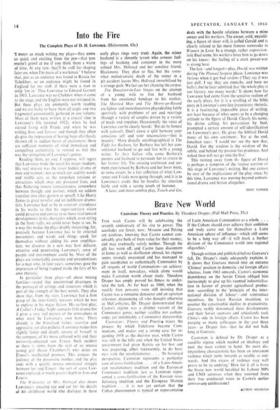Brave New World
Castroism: Theory and Practice. By Theodore Draper. (Pall Mall Press, 35s.) THIS week Castro will be celebrating the seventh anniversary of his rise to power. The accolades are fewer, now ; Moscow and Peking are cautious, knowing that Castro cannot con- ceivably give both of them value for their money, and may eventually satisfy neither. Though the gilt has worn off, and Castro faces discontent at home as well as disillusion abroad, his regime seems strongly ensconced and has managed to gain acceptance as authentically Communist by all streams of world Communism—an achieve- ment in itself, nowadays, which alone would make Castroism worth closer study. Theodore Draper has amply proved his fitness to under- take the task. As far back as 1960, when the weekly bien pensants were still insisting that Castro was a romantic democrat and an agrarian reformer, denouncing all who thought otherwise as McCarthyites, Dr. Draper demonstrated that Castro's regime was a distinct variant of the Communist genus, neither satellite nor carbon- copy, yet indubitably a Communist dictatorship.
Castroism : Theory and Practice traces the process by which Fidelismo became Com- munism, and makes out a strong case for re- garding 1958 as the decisive year, while Castro was still in the hills and when the United States government had given Batista up for lost and was preparing, albeit lukewarmly, to do busi- ness with the revolutionaries. . . . 'In historical perspective, Castroism represents a particular case of cross-fertilisation . . . of a Latin-Ameri- can revolutionary tradition and the European Communist tradition, just as Leninism repre- sented a cross-fertilisation of the Russian revo- lutionary tradition and the European Marxist tradition . . . it is not yet certain that the Cuban phenomenon is typical or representative of Latin American Communism as a whole. . . . If the Cubans should ever achieve their ambition and truly carve out for themselves a Latin American sphere of influence—which still seems to be a long way off—it will mark a further division of the Communist world into regional oligarchies.'
Though written and published before Guevara's fall, Dr. Draper's study adequately explains it. It shows that Guevara moved into an extreme 'Chinese' position in domestic and foreign affairs whereas, from 1963 onwards, Castro's economic dependence on the Soviet Union obliged him increasingly to give up his vaunted industrialisa- tion in favour of greater agricultural produc- tion—according to the 'principle of the inter- national division of labour"—and reintroduce incentives, the latest Russian invention, to counter the catastrophic decline in productivity. Guevara rashly denounced these developments and their Soviet sponsors and articulately took China's side in foreign affairs. Castro has been purging so many colleagues in the' past three years--as Draper lists—that he did not balk long at Guevara.
Castroism is defined by Dr. Draper as a caudillo regime which needed an ideology and took the most violent to hand. `Its most dis- tinguishing characteristic has been an immanent violence which turns inwards as readily as out- wards. And this excess of violence may well prove to be its undoing.' How far it all is from the brave new world heralded by Labour MPs and CND actresses when they returned from their free conducted tours to Castro's earlier anniversary celebrations!
ALFRED SHERMAN






























 Previous page
Previous page